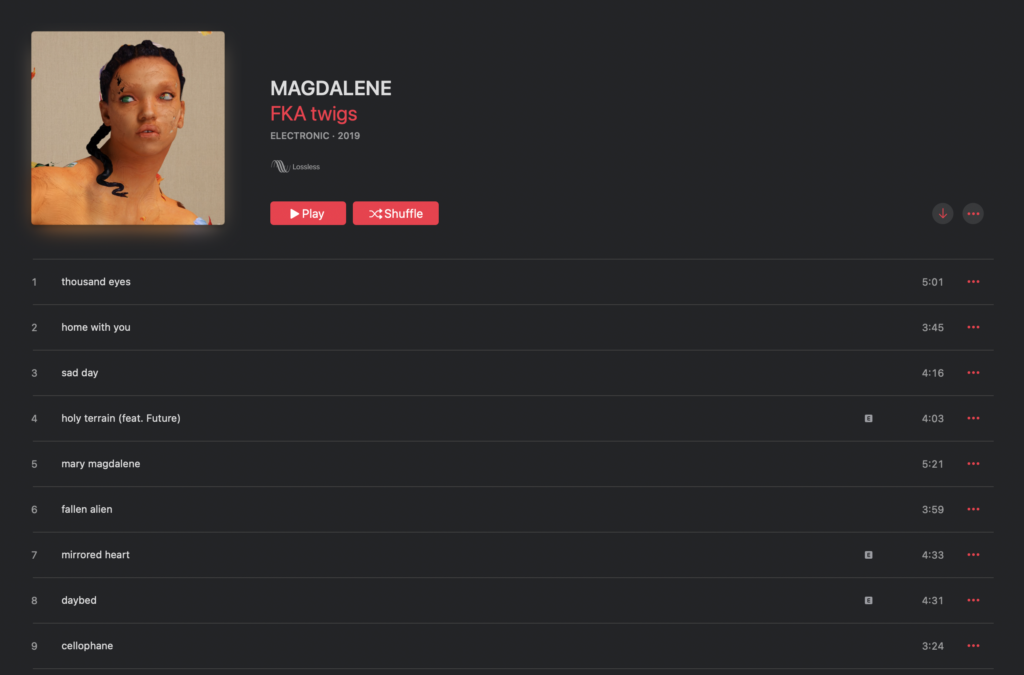By Socratis Santik Oglou,
The creation of “FKA Twigs” with her operatic vocal approach to club-electro alternative sounds and her distinctive art direction was the sole focus of her vision from her first video, 2012’s mesmerizing “Hide.” Since then, she has transformed her artwork into a kind of theatrical multimedia experience, creating elaborate performances and movies that blur the boundaries between classicism and avant-garde. She developed into one of the best and most distinctive artists of our time.
Twigs’s music has resonated most strongly when it is a component of a whole piece of art, despite her distinctive soprano vocals and experimental art creation. Add all of the aforementioned to Twigs’s inventiveness in the Eyeballs Epoch as well as 2015’s stunning M3LL155X EP, a somber and scathing look at genres including industrial, ballroom house, and triple-time rap-centered adventure music. Her song is played across the underground nightclubs because it allowed the beats to flow together with the completeness of her art. Due in large part to Twigs’s incredible dance abilities, which can dominate the show, Twigs occasionally overshadows the music. She adds so much elegance and sensuality to voguing and lyrical ballet that the passion of her music actually comes from her body.

Her first album in four years and by far her best, MAGDALENE is as introspective as anything she has written, but more overtly uses her voice as a vehicle for raw emotion. She has said she found comfort and inspiration in the story of Mary Magdalene, one of the most despised and misunderstood characters in the New Testament, whose complexities were rewritten by centuries of chauvinist churchmen into a fallen-woman footnote in Jesus’s story. The book was written during a publicly scrutinized relationship with a notoriously reluctant vampire, as well as a more private recovery from the removal of fibroids from her uterus. Twigs explores how severely conservative standards oppress women by placing them in Magdalene’s family. She does this by identifying a part of herself within these antiquated, repressive images, upending and transcending them with the force of her songwriting and the sheer magnetic pull of her presence.
With Twigs singing in the stern polyphony of medieval church music, the song “thousand eyes” introduces MAGDALENE. It is a contemplation on the instant before a permanent departure that, with repeated listening, shows itself to be a hymn. It serves as the introduction of an album whose songs are structured like stories with a prologue, climax, and conclusion. She struggles with survival — both psychologically and physically — in the same way, that a woman who loves to move might react to having tumors on an organ that aids in childbirth. In certain places, she is enraged, assaulting songs like the tender “home with you” and screaming standout “fallen alien” with virility and self-preservation. She refuses to shoulder the responsibility, even if things went bad: “I’m a fallen alien, I never believed that you would be the one to bind me down”, she snarls. “But you did in this era of Satan/I’m looking for a light to lead me back home”.

Although Future collaborated on the trunk-thumping song “holy terrain”, which is visceral and direct, MAGDALENE is not an attempt to create pop music in the sense of making the charts thump. It serves as a record of Twigs’s notable accomplishments in songwriting and musicality, as she explains her melodies without abandoning her point of view. One of MAGDALENE’s most astounding songs, “sad day”, features Twigs properly groveling at Kate Bush’s altar. They have obviously taken note of Kate Bush’s ability to transform inner sanctuary into dramatic, Shelleyan alt-pop. Twigs, Nicolas Jaar, Skrillex, and Benny Blanco collaborated to create an absolutely amazing production. An oscillating space synth is layered with skittering toms, creating a stage for Twigs’s voice and, in particular, the desperation of her boyfriend. We are in the midst of the story, teetering towards its inevitable conclusion, even if “sad day” does not explicitly tell a story through its lyrics. Instead, it does so emotionally through its production and Twigs’s delivery.
Twigs has already published three visuals to go along with its nine songs, so saying that the album stands alone does not mean her vision is completely abridged. Her pole-dancing abilities were displayed in a dissonantly somber ballad in the first, “cellophane”, which established the project’s tone (that she seems to find it humorous is a credit to her nature; serious artists who cannot laugh at themselves are the worst). The armchair interpretation of “cellophane” is a meditation on the virulent racism that revolting British tabloids and the worst of Twilight stans hurled at Twigs during her relationship with Robert Pattinson, but it is also a melancholy reflection on the insecurities that hound any unequal relationship.

The visual that Twigs has paired with “cellophane” — pole dancing, a feat of physical power set in opposition to the emotional strength she sings about lacking — conjures up the concept of giving a performance for the enjoyment of others. The sad solo dance is performed by a person who is both completely aware of herself and conscious of the fine line she is walking between agency and servitude.
“Cellophane”, the album’s closing track, serves as a retort to “thousand eyes” (how sickening it must be to be a woman artist constantly watched by bigoted tabloids interested in tearing you apart from the man you love, as they did Mary M. and Jesus), underscoring the sadness woven throughout MAGDALENE. But the fact that grief sparked such a powerful musical growth is sufficient proof that Twigs would always finds her way back.
References
- FKA twigs Is a Creature of Desire on “Magdalene”, nytimes.com, Available here
- FKA twigs: Magdalene review – stifled perfection from pop’s poledancing swordfighter, thegauardian.com, Available here
- FKA Twigs Makes Pop That Moves Beyond Genre on “Magdalene”, rollingstone.com, Available here
- FKA Twigs Makes Great Art Out of Great Pain on Magdalene, vulture.com, Available here




